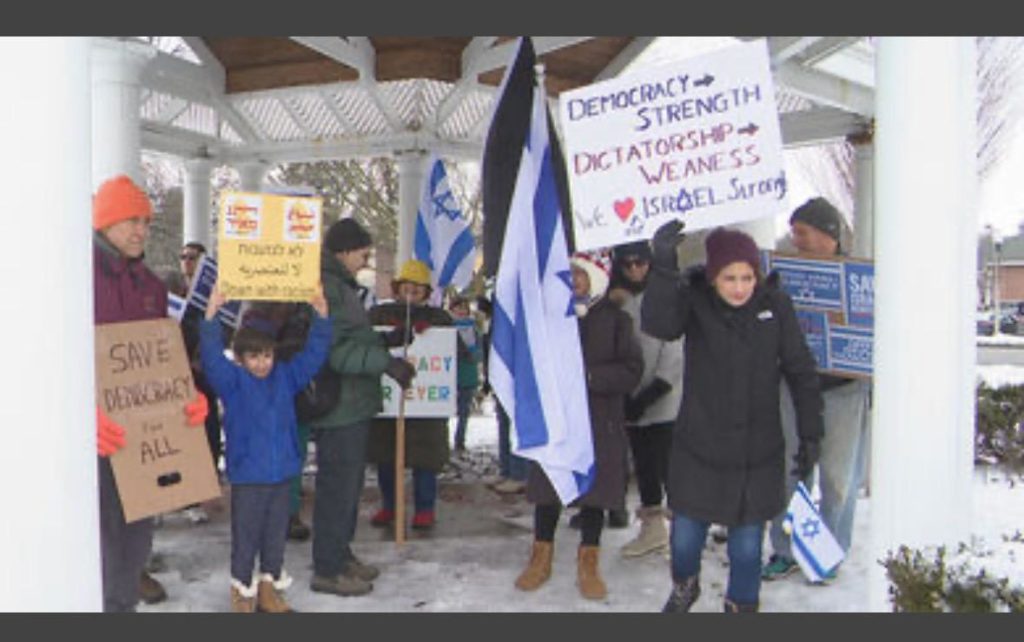On Sunday, February 26th I participated in a rally in support of Israelis who are protesting to keep the state Jewish and democratic. The rally was sponsored by unXeptable, which calls itself, “a grassroots movement launched by Israel expats in support of a democratic Israel.” Two of my adult children and their families also attended this event.
My daughter, who lived in Israel for several years, is part of a local Israeli expat WhatsApp group. Someone posted about the event on this group, and another member must have driven by the rally, after which she posted a response (in Hebrew) along with a photo. “These are the ‘love’ signs for the State of Israel. A boy with a kipah calling the State of Israel racist, and a man with a sign calling Israel a dictatorship. This is self-flagellation. This is what our enemies need to see.”
The boy in the kipah is my grandson. The sign he held was one I brought back from a recent trip to Israel, given to me by Gadi Gvaryahu, the Chairman of the group Tag Meir, an Israeli social justice organization. In addition to the group’s logo the sign says, in Hebrew, לא לגזענות, no to racism, the same phrase in Arabic, and Down with Racism, in English.
Social justice advocates I spoke with while in Israel used the language of racism in describing the current situation. Gadi said, “After the election in Israel, we have 14 Knesset members that are all racists, and they, unfortunately, control the government.” Rabbi Leah Shakdiel of Yeruham, an activist and scholar said, “I know enough Yiddishkeit to understand that those people can base their racist, ethnocratic, oppressive sense of Israeli Jewishness on Jewish sources. There are texts that support that in our long history; of course, they can. But I think that we have a responsibility to go through the rich legacy of previous generations, and also the rich legacy of the writers of the present generation and secure the kind of Jewish identity which aligns itself with the universal values of equal value of all human beings.”
There is another aspect of the post to the WhatsApp group that triggered an emotional response in me. “This is what our enemies need to see.” Our enemies? The language is jarring. What does this mean? It seems like code, as if it is lifted from another conversation or narrative, and not one I engage with.
Indeed, it is. In April of 2021 Arno Rosenfeld, in an article titled, Dark money, questionable partners behind new group fighting antisemitism, wrote in The Forward about the proliferation of new groups fighting antisemitism and their association with conservative Jewish billionaires. Rosenfeld says that this bevy of new groups, with opaque funding “is fueling the politicization of a cause that once united the Jewish community.” He quotes Andres Spokoiny, President of the Jewish Funders Network, “Much of the conversation about antisemitism has nothing to do with the antisemitism; it’s actually about influencing and controlling the conversation inside the Jewish community. It’s an arms race to define what is antisemitism in the Jewish community.” He focuses specifically on one group, the “Combat Anti-Semitism Movement” (CAM).
On February 22, 2023, Rosenfeld published another article in The Forward about a different group called “Shine A Light.” In this article, Carly Maisel, a spokesperson for “Shine A Light,” says that the connection between anti-Zionism and antisemitism “is front and center a part of Shine A Light.” She claims that “People inadvertently perpetuate antisemitism because they don’t understand what it is” and that you must take people on a journey to gain understanding. According to Rosenfeld, “Much of that journey presents Jews as being at odds with the political left.”
The politicization of antisemitism involves competing narratives. This includes debate about the main perpetrators of antisemitism, right wing neo-Nazis vs. left wing peace activists, but it is also about language and storytelling. Is antisemitism a hatred that denies Jews their humanity that we must combat by expressing our full humanity, or is it an inherent part of some vaguely defined enemies whom we have an obligation to hate in turn? The first definition generates a narrative of common humanity. The second definition, invoking our “enemies,” justifies both the Jewish violence in Hawara and the suppression of criticism of this violence.
Naomi Schlagman is a supporter of Tag Meir who hopes that the Zionist narrative of a Jewish nation among nations and a shared common humanity prevails.
